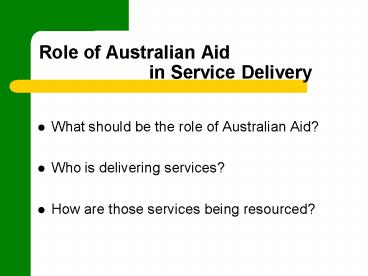Role of Australian Aid in Service Delivery - PowerPoint PPT Presentation
1 / 19
Title:
Role of Australian Aid in Service Delivery
Description:
... of development expenditures in key areas: Two thirds in health; ... Grants to sports clubs. Churches Partnership Program for HIV, health, education, training ... – PowerPoint PPT presentation
Number of Views:57
Avg rating:3.0/5.0
Title: Role of Australian Aid in Service Delivery
1
Role of Australian Aid in Service Delivery
- What should be the role of Australian Aid?
- Who is delivering services?
- How are those services being resourced?
2
Increased PNG Budget Allocation
- 2006 2007 budgets allocated more funding for
MTDS priorities - Health, Education, Transport - Two supplementary budgets
- A significant part of K1.1 billion allocated to
upgrading education, health and transport
infrastructure - K180 million allocated to upgrade facilities and
medical equipment - K150 million to upgrading national high schools,
primary high schools, provincial high schools and
technical and vocational centres.
3
But still inadequate
- Donors provide the bulk of development
expenditures in key areas - Two thirds in health
- Three quarters in education.
- Recurrent costs (eg salaries) average 42
- Not enough left for goods and services
4
Decline in Services
- One in 10 children die before their 5th birthday
- A woman in is 40 times more likely to die in
childbirth than a woman in Australia - Gross primary school enrolment only 59
5
Why? Analysis by NEFC
- Confusion of roles and responsibilities between
national and sub-national levels of government - often exacerbated by poor communication
- poor accountability mechanisms
- Inequitable intergovernmental financing
arrangements - many provinces not adequately
funded - inadequate support from national agencies
- lack of capacity
6
Australian Support to National Government Agencies
- Central Agencies (Treasury, Finance etc)
- Eg Treasury, Finance
- Improve management build capacity
- Strengthen processes systems
- National Departments (Health, Education, Works)
- Eg NDoH, NDoE, Dept Works, etc
- Improve management build capacity
- Improve processes systems
7
AusAID support to National Government Departments
- AusAID Funds for key services 2006 / 2007
- Health gt 100m kina
- Education gt 100m kina
- Infrastructure gt 120m kina
- HIV gt 50m kina
- Increasingly through Sector Wide Approaches
- Infrastructure 85 through NDoW
- Education 27 through NDoE
8
Australias Support to Statutory Bodies
- Electoral Commission
- Election preparedness implementation
- Voter education
- National Broadcasting Commission
- Access to information
- Voice of the people of PNG
- PNG Sports Foundation
- Community Development eg Strongim Komuniti Klabs
- Awareness raising eg HIVAIDS Gender Based
Violence
9
AusAID Sub-National Strategy
- DLPGAs PPII program
- improve provincial corporate and administrative
systems - support better service delivery.
- Initial three provinces with six more provinces
coming on stream this year. - Positive incentive approach.
- NRI review of the organic law on provincial and
local level government - NEFC new intergovernmental financing arrangements
more provinces better off
10
(No Transcript)
11
Who is Delivering the Services?
- Not all services are delivered by government
- Private Sector delivers services
- resource companies eg mines community development
- contracting companies national and
international - small enterprises responding to demand
- Non-Governmental Agencies deliver services
- Salamo Uniting Church training centre
- Environmental NGOs
- Communities provide their own services
- Often with limited or no external support
12
Churches Role in Service Delivery
- 46 of all health facilities
- 60 of rural health services
- 5 out of 8 nursing schools
- all 14 community health worker schools
- 47 of elementary schools
- 53 of primary schools
- 30 of secondary schools
- 41 vocational schools
- 67 teacher education institutions
13
AusAID support to Civil Society
- AusAID directly supports civil society to deliver
services - Community Development Scheme over 1,000 grants
to communities civil society partners
nationwide (eg Milne Bay Counselling) - Grants to NGOs to carry out electoral awareness
raising - Grants to community radio or other media
organisations to improve access to information - Grants to sports clubs
- Churches Partnership Program for HIV, health,
education, training
14
AusAID support to Civil Society
- AusAID also supports civil society to-
- Encourage debate eg PNG Update
- Demand and develop mechanisms for good governance
- eg accountability, transparency, inclusion,
particpation - BE accountable ie get their own houses in
order. Are they democratic? Are women and youth
involved in making decisions?
15
Who is Resourcing Services?
- PNG Government funds non-state agencies (NGOs,
CSOs, and Churches) to deliver services - Donors fund service delivery by non-government
agencies - Private sector funds services as well as
providing them - Communities individuals make significant
contributions in cash or in kind - Service Delivery requires a Partnership
16
Democratic Governance?
- Constructive partnerships between the state,
civil society and private companies - Strengthen all organisations so that are able to
perform their responsibilities - Encourage and foster democratic structures and
processes in all organisations suited to the
local or ognaisational context.
17
Democratic Governance Program - Strategic
Principles
- Foster state and civil society partnerships
- Work as local a level as possible
- Build PNG capacity to train, advise and build
capacity
18
Democratic Governance Program
- Participatory Planning
- Small Grants for Community Projects
- Strengthening of local organisations
- eg LLGs, CSOs, village courts, CBOs, churches,
customary groups, etc - Awareness raising
- eg Elections, LPV, Gender equality, HIV/AIDS,
Human Rights, Nation building, peace, restorative
justice
19
Role of Australian Aid in Service Delivery?
- To support service provision by supporting the
strengthening of government and non-government
systems and processes - To foster and promote democratic governance in
government and non-government systems and
processes































